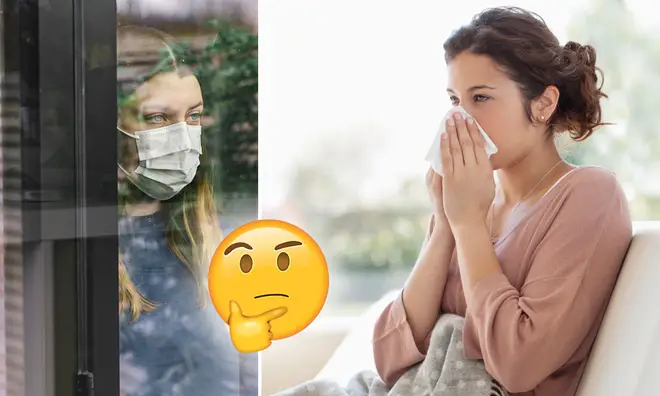Coronavirus Or Hay Fever? How To Tell The Difference In The Symptoms
15 May 2020, 11:21

This time of the year can wreak havoc with your nasal passages if you’re a hey fever sufferer, but how can you tell the difference between seasonal allergies and something more concerning like coronavirus?
As the weather warms up between March and September, the pollen count increases, giving a lot of people a runny nose, itchy eyes, and occasionally a cough.
Doctors are warning people not to confuse the symptoms of allergies with coronavirus, as some may be leaving their house while blaming their symptoms on hay fever.
Tap Here For NHS Updates On Coronavirus (COVID-19)
When Can Gyms Reopen In The UK?
But are hay fever symptoms the same as coronavirus symptoms?

Coronavirus, Explained | Official Trailer | Netflix
According to the NHS, symptoms of hay fever are:
- Sneezing and coughing
- A runny or blocked nose
- Itchy, red or watery eyes
- Itchy throat, mouth, nose and ears
- Loss of smell
- Pain around your temples and forehead
- Headache
- Earache
- Feeling tired
The two most common symptoms of coronavirus are a new and continuous dry cough and a fever.
But other symptoms could include; shortness of breath, a stuffy nose, and fatigue, which could also be confused for coronavirus.
To tell the difference, Dr Sachak told Express.co.uk most people with hay fever do not feel unwell and symptoms tend to be easily controlled with basic antihistamines or nasal sprays.

Hay fever sufferers experience a few different symptoms in varying degrees – you may only have one or two hay fever symptoms if you are allergic to pollen.
Dr Sachak explained: "Hay fever and allergy symptoms tend to be milder and fluctuate depending on the time of day as pollen levels are often higher in the afternoon and evening.
"Similarly, wet weather may lead to patients experiencing milder symptoms.
"The main symptoms of coronavirus are a high temperature or new continuous cough.
"The symptoms can overlap but the key differences are that hay fever does not cause a high temperature.”
If you are worried you have coronavirus, check your symptoms on the NHS website or call 111.
> Download Our App For All The Latest News














